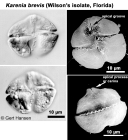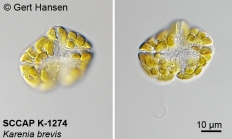WoRMS taxon details
Karenia brevis (C.C.Davis) Gert Hansen & Moestrup, 2000
233015 (urn:lsid:marinespecies.org:taxname:233015)
accepted
Species
Gymnodinium breve C.C.Davis, 1948 · unaccepted (basionym)
Gymnodinium brevis Davis, 1948 · unaccepted (synonym)
Ptychodiscus brevis (C.C.Davis) K.A.Steidinger, 1979 · unaccepted (synonym)
marine
(of Gymnodinium breve C.C.Davis, 1948) Davis C. C. 1948. <i>Gymnodinium brevis</i> sp. nov., a cause of discolored water and animal mortality in the Gulf of Mexico. Bot. Gaz. 109: 358-360. [details]
Type locality contained in Gulf of Mexico
type locality contained in Gulf of Mexico [details]
LSID urn:lsid:algaebase.org:taxname:50162
Description Medium-sized cells (23–34 μm long, 24–26 μm wide), very dorso-ventrally flattened (10–15 μm deep), with a convex...
LSID urn:lsid:algaebase.org:taxname:50162 [details]
Description Medium-sized cells (23–34 μm long, 24–26 μm wide), very dorso-ventrally flattened (10–15 μm deep), with a convex...
Description Medium-sized cells (23–34 μm long, 24–26 μm wide), very dorso-ventrally flattened (10–15 μm deep), with a convex dorsal side and a concave ventral side. Rounded epicone with a prominent bulbous apical protrusion. Hypocone notched and slightly bilobed. Cingulum slightly displaced. Sulcus extending onto the epicone. Numerous yellow-green chloroplasts. Spherical nucleus located in the left side of the hypocone. Apical groove extending a little onto the dorsal epicone. (Davis, 1948; Steidinger and Baden, 1984; Haywood et al., 2004). Taxonomically, Gymnodinium brevis was renamed G. breve in the 1960s. Later on, the genus name was changed to Ptychodiscus (Steidinger), later moved back to G. breve and finally to Karenia brevis in 2000. [details]
Guiry, M.D. & Guiry, G.M. (2025). AlgaeBase. World-wide electronic publication, National University of Ireland, Galway (taxonomic information republished from AlgaeBase with permission of M.D. Guiry). Karenia brevis (C.C.Davis) Gert Hansen & Moestrup, 2000. Accessed through: World Register of Marine Species at: https://marinespecies.org/aphia.php?p=taxdetails&id=233015 on 2025-04-17
Date
action
by
2006-07-26 06:43:45Z
created
Camba Reu, Cibran
2015-06-26 12:00:51Z
changed
db_admin
Copyright notice: the information originating from AlgaeBase may not be downloaded or replicated by any means, without the written permission of the copyright owner (generally AlgaeBase). Fair usage of data in scientific publications is permitted.
Nomenclature
original description
(of Gymnodinium breve C.C.Davis, 1948) Davis C. C. 1948. <i>Gymnodinium brevis</i> sp. nov., a cause of discolored water and animal mortality in the Gulf of Mexico. Bot. Gaz. 109: 358-360. [details]
basis of record Gómez, F. (2005). A list of free-living dinoflagellate species in the world's oceans. <em>Acta Bot. Croat.</em> 64(1): 129-212. [details]
basis of record Guiry, M.D. & Guiry, G.M. (2025). AlgaeBase. <em>World-wide electronic publication, National University of Ireland, Galway.</em> searched on YYYY-MM-DD., available online at http://www.algaebase.org [details]
new combination reference Daugbjerg, N.; Hansen, G.; Larsen, J.; Moestrup, O. (2000). Phylogeny of some of the major genera of dinoflagellates based on ultrastructure and partial LSU rDNA sequence data, including the erection of three new genera of unarmoured dinoflagellates. <em>Phycologia.</em> 39(4): 302-317., available online at https://doi.org/10.2216/i0031-8884-39-4-302.1 [details]
basis of record Gómez, F. (2005). A list of free-living dinoflagellate species in the world's oceans. <em>Acta Bot. Croat.</em> 64(1): 129-212. [details]
basis of record Guiry, M.D. & Guiry, G.M. (2025). AlgaeBase. <em>World-wide electronic publication, National University of Ireland, Galway.</em> searched on YYYY-MM-DD., available online at http://www.algaebase.org [details]
new combination reference Daugbjerg, N.; Hansen, G.; Larsen, J.; Moestrup, O. (2000). Phylogeny of some of the major genera of dinoflagellates based on ultrastructure and partial LSU rDNA sequence data, including the erection of three new genera of unarmoured dinoflagellates. <em>Phycologia.</em> 39(4): 302-317., available online at https://doi.org/10.2216/i0031-8884-39-4-302.1 [details]
Ecology
ecology source
Leles, S. G.; Mitra, A.; Flynn, K. J.; Tillmann, U.; Stoecker, D.; Jeong, H. J.; Burkholder, J.; Hansen, P. J.; Caron, D. A.; Glibert, P. M.; Hallegraeff, G.; Raven, J. A.; Sanders, R. W.; Zubkov, M. (2019). Sampling bias misrepresents the biogeographical significance of constitutive mixotrophs across global oceans. <em>Global Ecology and Biogeography.</em> 28(4): 418-428., available online at https://doi.org/10.1111/geb.12853 [details] Available for editors  [request]
[request]
ecology source Mitra, A.; Caron, D. A.; Faure, E.; Flynn, K. J.; Leles, S. G.; Hansen, P. J.; McManus, G. B.; Not, F.; Do Rosario Gomes, H.; Santoferrara, L. F.; Stoecker, D. K.; Tillmann, U. (2023). The Mixoplankton Database (MDB): Diversity of photo‐phago‐trophic plankton in form, function, and distribution across the global ocean. <em>Journal of Eukaryotic Microbiology.</em> 70(4)., available online at https://doi.org/10.1111/jeu.12972 [details]
ecology source Glibert, P.; Burkholder, J.; Kana, T.; Alexander, J.; Skelton, H.; Shilling, C. (2009). Grazing by Karenia brevis on Synechococcus enhances its growth rate and may help to sustain blooms. <em>Aquatic Microbial Ecology.</em> 55: 17-30., available online at https://doi.org/10.3354/ame01279 [details]
ecology source Mitra, A.; Caron, D. A.; Faure, E.; Flynn, K. J.; Leles, S. G.; Hansen, P. J.; McManus, G. B.; Not, F.; Do Rosario Gomes, H.; Santoferrara, L. F.; Stoecker, D. K.; Tillmann, U. (2023). The Mixoplankton Database (MDB): Diversity of photo‐phago‐trophic plankton in form, function, and distribution across the global ocean. <em>Journal of Eukaryotic Microbiology.</em> 70(4)., available online at https://doi.org/10.1111/jeu.12972 [details]
ecology source Glibert, P.; Burkholder, J.; Kana, T.; Alexander, J.; Skelton, H.; Shilling, C. (2009). Grazing by Karenia brevis on Synechococcus enhances its growth rate and may help to sustain blooms. <em>Aquatic Microbial Ecology.</em> 55: 17-30., available online at https://doi.org/10.3354/ame01279 [details]
Other
context source (HKRMS)
Clark, A. M. (1982). Echinoderms of Hong Kong. <em>In: Morton B, editor. Proceedings of the first international marine biological workshop: The marine flora and fauna of Hong Kong and southern China. Hong Kong University Press, Hong Kong.</em> 1: 485-501. [details]
additional source Guiry, M.D. & Guiry, G.M. (2025). AlgaeBase. <em>World-wide electronic publication, National University of Ireland, Galway.</em> searched on YYYY-MM-DD., available online at http://www.algaebase.org [details]
additional source Steidinger, K. A., M. A. Faust, and D. U. Hernández-Becerril. 2009. Dinoflagellates (Dinoflagellata) of the Gulf of Mexico, Pp. 131–154 in Felder, D.L. and D.K. Camp (eds.), Gulf of Mexico–Origins, Waters, and Biota. Biodiversity. Texas A&M Press, College [details]
additional source Moestrup, Ø., Akselman, R., Cronberg, G., Elbraechter, M., Fraga, S., Halim, Y., Hansen, G., Hoppenrath, M., Larsen, J., Lundholm, N., Nguyen, L. N., Zingone, A. (Eds) (2009 onwards). IOC-UNESCO Taxonomic Reference List of Harmful Micro Algae., available online at http://www.marinespecies.org/HAB [details]
additional source Liu, J.Y. [Ruiyu] (ed.). (2008). Checklist of marine biota of China seas. <em>China Science Press.</em> 1267 pp. (look up in IMIS) [details] Available for editors [request]
[request]
toxicology source Landsberg J.H. & Steidinger K.A. 1998. A historical review of <i>Gymnodinium breve</i> red tides implicated in mass mortalities of the manatee (<i>Trichechus manatus latirostris</i>) in Florida. In: <i>Harmful Algae</i> (Ed. by B. Reguera, J. Blanco, M. L. Fernández & T. Wyatt), pp. 97-100. Xunta de Galicia and IOC, UNESCO, Santiago de Compostela. [details]
additional source Guiry, M.D. & Guiry, G.M. (2025). AlgaeBase. <em>World-wide electronic publication, National University of Ireland, Galway.</em> searched on YYYY-MM-DD., available online at http://www.algaebase.org [details]
additional source Steidinger, K. A., M. A. Faust, and D. U. Hernández-Becerril. 2009. Dinoflagellates (Dinoflagellata) of the Gulf of Mexico, Pp. 131–154 in Felder, D.L. and D.K. Camp (eds.), Gulf of Mexico–Origins, Waters, and Biota. Biodiversity. Texas A&M Press, College [details]
additional source Moestrup, Ø., Akselman, R., Cronberg, G., Elbraechter, M., Fraga, S., Halim, Y., Hansen, G., Hoppenrath, M., Larsen, J., Lundholm, N., Nguyen, L. N., Zingone, A. (Eds) (2009 onwards). IOC-UNESCO Taxonomic Reference List of Harmful Micro Algae., available online at http://www.marinespecies.org/HAB [details]
additional source Liu, J.Y. [Ruiyu] (ed.). (2008). Checklist of marine biota of China seas. <em>China Science Press.</em> 1267 pp. (look up in IMIS) [details] Available for editors
toxicology source Landsberg J.H. & Steidinger K.A. 1998. A historical review of <i>Gymnodinium breve</i> red tides implicated in mass mortalities of the manatee (<i>Trichechus manatus latirostris</i>) in Florida. In: <i>Harmful Algae</i> (Ed. by B. Reguera, J. Blanco, M. L. Fernández & T. Wyatt), pp. 97-100. Xunta de Galicia and IOC, UNESCO, Santiago de Compostela. [details]
 Present
Present  Present in aphia/obis/gbif/idigbio
Present in aphia/obis/gbif/idigbio  Inaccurate
Inaccurate  Introduced: alien
Introduced: alien  Containing type locality
Containing type locality
From editor or global species database
LSID urn:lsid:algaebase.org:taxname:50162 [details]From regional or thematic species database
Description Medium-sized cells (23–34 μm long, 24–26 μm wide), very dorso-ventrally flattened (10–15 μm deep), with a convex dorsal side and a concave ventral side. Rounded epicone with a prominent bulbous apical protrusion. Hypocone notched and slightly bilobed. Cingulum slightly displaced. Sulcus extending onto the epicone. Numerous yellow-green chloroplasts. Spherical nucleus located in the left side of the hypocone. Apical groove extending a little onto the dorsal epicone. (Davis, 1948; Steidinger and Baden, 1984; Haywood et al., 2004). Taxonomically, Gymnodinium brevis was renamed G. breve in the 1960s. Later on, the genus name was changed to Ptychodiscus (Steidinger), later moved back to G. breve and finally to Karenia brevis in 2000. [details]Harmful effect Marine animal mortalities, NSP, respiratory irritation [details]
Published in AlgaeBase  (from synonym Gymnodinium breve C.C.Davis, 1948)
(from synonym Gymnodinium breve C.C.Davis, 1948)
Published in AlgaeBase
Published in AlgaeBase (from synonym Ptychodiscus brevis (C.C.Davis) K.A.Steidinger, 1979)
(from synonym Ptychodiscus brevis (C.C.Davis) K.A.Steidinger, 1979)
To Barcode of Life (2 barcodes)
To Biodiversity Heritage Library (17 publications) (from synonym Ptychodiscus brevis (C.C.Davis) K.A.Steidinger, 1979)
To Biodiversity Heritage Library (24 publications) (from synonym Gymnodinium brevis Davis, 1948)
To Biodiversity Heritage Library (4 publications)
To Biodiversity Heritage Library (50 publications) (from synonym Gymnodinium breve C.C.Davis, 1948)
To European Nucleotide Archive, ENA (Karenia brevis)
To GenBank (243310 nucleotides; 69210 proteins) (from synonym Gymnodinium breve C.C.Davis, 1948)
To GenBank (243310 nucleotides; 69210 proteins) (from synonym Ptychodiscus brevis (C.C.Davis) K.A.Steidinger, 1979)
To GenBank (243310 nucleotides; 69210 proteins)
To PESI
 (from synonym Gymnodinium breve C.C.Davis, 1948)
(from synonym Gymnodinium breve C.C.Davis, 1948)Published in AlgaeBase

Published in AlgaeBase
 (from synonym Ptychodiscus brevis (C.C.Davis) K.A.Steidinger, 1979)
(from synonym Ptychodiscus brevis (C.C.Davis) K.A.Steidinger, 1979)To Barcode of Life (2 barcodes)
To Biodiversity Heritage Library (17 publications) (from synonym Ptychodiscus brevis (C.C.Davis) K.A.Steidinger, 1979)
To Biodiversity Heritage Library (24 publications) (from synonym Gymnodinium brevis Davis, 1948)
To Biodiversity Heritage Library (4 publications)
To Biodiversity Heritage Library (50 publications) (from synonym Gymnodinium breve C.C.Davis, 1948)
To European Nucleotide Archive, ENA (Karenia brevis)
To GenBank (243310 nucleotides; 69210 proteins) (from synonym Gymnodinium breve C.C.Davis, 1948)
To GenBank (243310 nucleotides; 69210 proteins) (from synonym Ptychodiscus brevis (C.C.Davis) K.A.Steidinger, 1979)
To GenBank (243310 nucleotides; 69210 proteins)
To PESI


